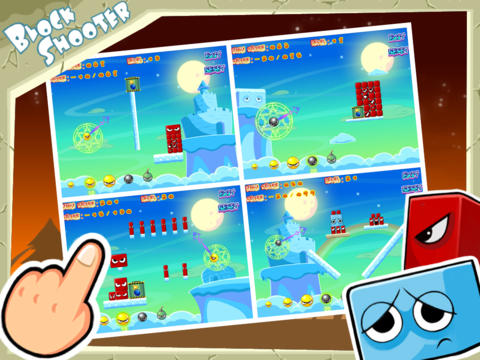
#Block shooter games no blood no person Pc
Photograph: Barcroft Media/GettyĪt the time, home internet was slow, so children started going to internet cafes to play PC games. “But most of the parents would complain later that ‘This is not a study machine, it’s just a console.’”Įsports fans at the Tencent V-Station watch the live broadcast of the League of Legends S10 finals in Shanghai in October 2020. “Families would buy their children a home computer because they believed it was a way to boost grades at school,” she told me. Today, Allison Yang Jing is an established game developer in Hong Kong, but at the turn of the millennium she was a 13-year-old living in western China. But the ban did not include personal computers, and pirated copies of video games became widely available on the black market. In 2000, the Communist party banned gaming consoles and arcade machines outright. Around the turn of the century, Chinese officials and the media started to describe games as “digital opium” or “electronic heroin”. Like many governments around the world, the Chinese authorities were wary of this emerging interactive entertainment, and worried about its impact on young people.

Video game consoles started to arrive in China in the late 80s – some legally imported from Japan, others smuggled in to avoid high customs taxes – and arcades popped up around the country throughout the 90s. Yet, for decades, China has had a stop-start relationship with the entire industry. Its domestic market is worth more than $45bn a year. Today, the number of Chinese gamers, about 740 million, is bigger than the entire populations of the US, Japan, Germany, France and the UK combined. “It’s a bit of a black box.” Five years after its big announcement, Stellaris has never officially launched in China.Ĭhina is the world’s largest market for the world’s largest entertainment industry. “Working through the ministry of culture, the censorship is not a super-clear process,” said Jorjani. “From our perspective, it should have been largely problem-free because it doesn’t deal with any nations, Chinese or otherwise,” said Jorjani. Paradox was so confident of success that in December 2016, it took the unusual step of announcing that it would launch in China even before a licence had been granted. As part of the deal, Tencent bought 5% of its shares. Still, to help navigate the Chinese market, the developer partnered with the Chinese megacorp Tencent, the biggest game publisher in the world. Unlike Hearts of Iron, Stellaris was a game set in the distant future, involving intergalactic travel and aliens. The company was not concerned about a repeat of 2004. (China argues that Tibet has been an inextricable part of its territory for centuries.) The Chinese ministry of culture accused the game of “distorting history and damaging China’s sovereignty and territorial integrity”. Hearts of Iron was set during the second world war and touched on numerous sensitive issues – not least by portraying Tibet as a sovereign country. In 2004, the ministry of culture had banned another one of its releases, Hearts of Iron, confiscating CD-Roms and shutting down websites that sold the game. Another type of alien is a sentient crystal that eats rocks.) (My personal favourite dresses in a lavish golden cape and has a head like an otter’s, with soft reddish-brown fur, dark eyes and a black snout. Gamers could choose to play as the human race, or one of many alien species. In this virtual universe, players could explore richly detailed galaxies, command their own fusion-powered starship fleets and fight with extraterrestrials to expand their space empires.

Its new game, Stellaris, was a work of sprawling science fiction, set 200 years in the future. Most of its biggest hits, such as the middle ages-themed Crusader Kings, or Sengoku, in which you play as a 16th-century Japanese noble, were loosely based on history.īut in 2016, Paradox decided to try something a little different. “Deep, endless, complex, unyielding games,” is how Shams Jorjani, the company’s chief business development officer, describes Paradox’s offerings. In the years after it was founded in 1999, the Swedish video game company Paradox Interactive quietly built a reputation for developing some of the best, and most hardcore, strategy games on the market.


 0 kommentar(er)
0 kommentar(er)
